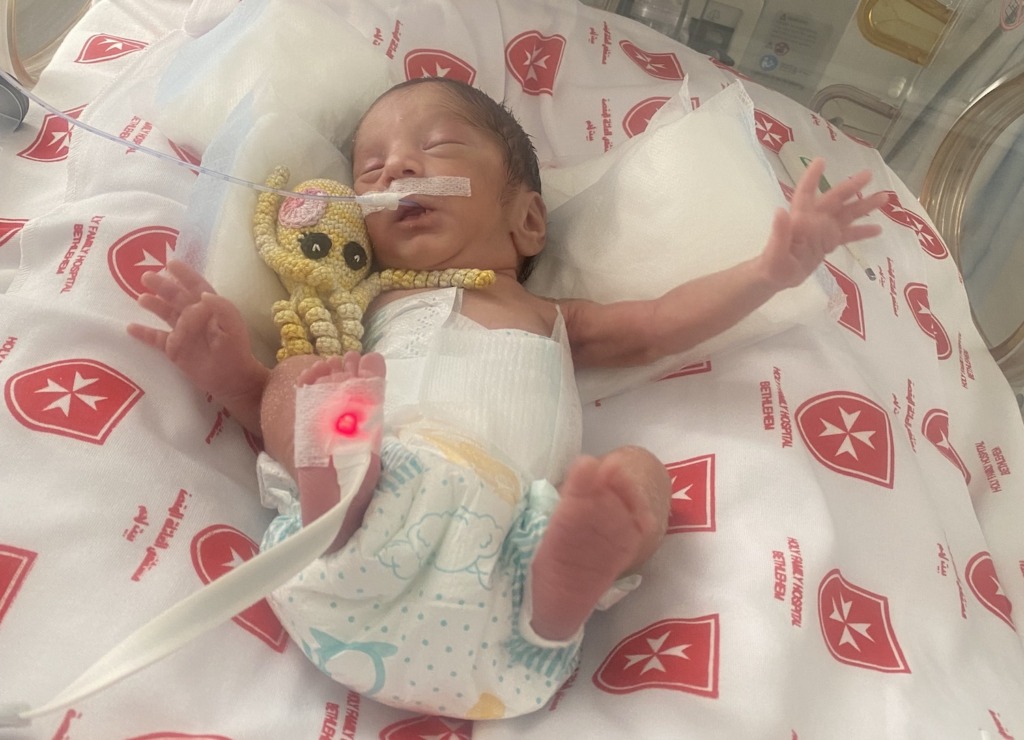If you ask Michele Rowe about Bethlehem, don’t expect her to provide you with a Christmas card image.
“The poor Blessed Mother had to deliver her baby in a manger accompanied by animals, and you can only imagine the shame of poor St. Joseph,” she said.
Rowe, as the Order of Malta’s ambassador to Palestine and president of the Holy Family Hospital of Bethlehem Foundation on whose board Bishop Barry C. Knestout serves, sees the services provided by the hospital as “reparations to the Holy Family.”
“Every day we work in service not only to the mothers and babies of Bethlehem, but to the Holy Family,” she said. “This is to say that never again will a woman need to deliver in the accompaniment of animals.”
Ten days prior to speaking at the Cathedral of the Sacred Heart the weekend of June 11-12, she spoke to The Catholic Virginian about the hospital and why it is critical to life in Bethlehem.
“It’s a touchstone — a beautiful old building, gorgeous green grass, olive, lemon, orange trees — for women to deliver their babies and for older women who are suffering from menopausal symptoms to be able to have their health and dignity restored through some sort of surgery or treatment,” she said, noting that over 70% of the area’s babies are delivered there.
The hospital serves a greater good in a community that is still feeling the economic effects of COVID.
“Since the COVID pandemic happened in Bethlehem, it’s become a devastating crisis,” Rowe said. “The impact is just incredible. The stores are closed. The hotels are closed. Bethlehem is 90% dependent economically on the pilgrimage industry and the pilgrimage industry hasn’t come back.”
Holy Family Hospital is Bethlehem’s largest employer with 191 employees — all Palestinians.
“We provide hope not just through good health care, but through good employment,” she said. “So when our employees go out into the community they can help people. They can pay their rent, buy their groceries — we source everything at the hospital that we can locally. We’re an employer of choice, a good neighbor and good corporate citizen.”
Those are the fortunate ones.
“Ninety percent of the workforce has been without salaries since March 2020,” she said. “Families have been sharing, making their tables longer, but after two years, it’s running out.”
Rowe said that taking care of people’s health addresses only part of the problem. Care must extend “systemically.”
“We have delivered babies as small as 1 pound, and we’re seeing more of them because of the stresses, the lack of nutrition, food insecurity,” she said. “So, if you save a 1-pound baby, you can’t pat yourself on the back for a great job because after four, five, six months, when that baby goes home, what are they going home to? A family that can’t feed them.”
To help remedy that, the hospital has developed a program with the local Catholic parish and their social workers to help provide groceries, medication, formula, diapers and electricity.
“None of this is done with cash. You have food coupons,” Rowe said. “We have arrangements with stores who have been generous, giving a 20% discount, so there has been a multiplier effect.”
According to Rowe, “Our unwritten goal is to keep Christians in the Holy Land, because how can we run a Catholic hospital, how can it remain Catholic, without Catholic employees?”
The best way to keep Christians from leaving the Holy Land, Rowe said, is to have a better economy.
“The reason why they leave is because of the lack of an economic future,” she said.
With Russia’s invasion of Ukraine, and with other issues in the Middle East, Rowe is concerned that Bethlehem is being forgotten.
“As the first Christians, we owe them, in my opinion, the right to be able to stay in their country, the right to be able to live with a future for their children and grandchildren, and to continue that very important witness to the faith of the Christian community,” she said.
Editor’s note: For further information about the Holy Family Hospital of Bethlehem Foundation, visit www.birthplaceofhope.org or call 202-785-0801.

